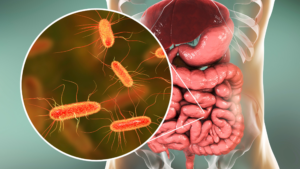Tiny Organisms, Big Impact: Why Your Gut Microbiome Matters
Your gut is more than just a digestive powerhouse; it’s a bustling metropolis of microscopic life that plays a critical role in your overall health. Hidden beneath the surface, within your digestive system, lives a community of trillions of bacteria, viruses, fungi, and other tiny organisms. This complex ecosystem, known as the gut microbiome, is far more influential than you might think. In fact, it’s a game-changer when it comes to everything from your mood to your immunity.
But what exactly is this microbial community, and why should you care about it? Let’s break it down and explore how these tiny organisms are making a huge impact on your health and well-being!
What is the Gut Microbiome?
The term “gut microbiome” refers to the vast array of microorganisms that reside in your digestive tract. It’s estimated that the human gut is home to over 100 trillion bacteria—that’s more than the total number of human cells in your body! These microorganisms live in a delicate balance, working together to perform various functions that are essential for good health.
While the term “microbiome” sounds a bit sci-fi, its effects are incredibly real, and scientists have only begun to scratch the surface of understanding just how influential these microbes are.
Gut Microbiome and Digestion: The Dynamic Duo
At its core, the microbiome plays a pivotal role in digesting food. Your digestive system isn’t capable of breaking down certain complex fibers on its own, but your gut microbes can! They work to ferment these fibers and convert them into short-chain fatty acids (SCFAs), which are a vital energy source for your cells and can even help reduce inflammation.
But it’s not just about breaking down food. The gut microbiome also plays a huge part in synthesizing key vitamins, like vitamin K and B vitamins, which are crucial for blood clotting and energy production.
The Immune System’s Hidden Ally
You might be surprised to learn that nearly 70% of your immune system resides in your gut! Your microbiome has a significant influence on immune function, helping to regulate inflammation, prevent infections, and defend against harmful pathogens. A healthy gut can ensure that your immune system remains strong and balanced, while an imbalanced microbiome may lead to an overactive immune response, contributing to autoimmune diseases or chronic conditions like irritable bowel syndrome (IBS).
Mood and Mental Health: Gut Feeling, Gut Brain
It’s not just your stomach that benefits from a healthy microbiome—your brain does, too! Research has revealed a direct connection between the gut and the brain, often referred to as the “gut-brain axis.” This connection allows signals to travel between the two, influencing mood, stress responses, and mental health.
The gut microbiome produces neurotransmitters like serotonin, which is often called the “feel-good” hormone. In fact, about 90% of serotonin is made in the gut, meaning your gut health can significantly affect how you feel mentally. A well-balanced microbiome can promote emotional well-being, while an unhealthy gut can contribute to conditions like anxiety and depression.
A Balanced Microbiome = A Balanced Life
As science continues to uncover the vital relationship between the gut microbiome and your overall health, it’s clear that maintaining a balanced microbiome is essential for long-term wellness. When the balance is disrupted, it can lead to a range of health issues, including digestive disorders, autoimmune conditions, and even mental health problems.
So, how can you nurture your gut’s tiny organisms to keep them happy and healthy? Here are a few tips:
1. Eat a Diverse, Fiber-Rich Diet
Different microbes thrive on different nutrients, so a variety of foods is key. Focus on eating a range of fruits, vegetables, whole grains, legumes, and nuts to fuel your microbiome with fiber.
2. Probiotics and Fermented Foods
Probiotics, found in foods like yogurt, kefir, sauerkraut, and kimchi, contain beneficial bacteria that help maintain a healthy gut. These foods can introduce new microbes to your system and help diversify your microbiome.
3. Prebiotics Are Your Gut’s Favorite Snack
Prebiotics are fiber compounds that feed your good bacteria. Foods like garlic, onions, asparagus, and bananas are great sources of prebiotics.
4. Limit Artificial Sweeteners
While it may be tempting to reach for that low-calorie sweetener, studies suggest that artificial sweeteners can disrupt your gut microbiome by encouraging the growth of harmful bacteria. Stick to natural sources of sweetness when you can!
5. Reduce Stress
Remember, your gut and your brain are in constant communication. Managing stress with relaxation techniques like meditation, exercise, or simply taking a break can help keep your microbiome balanced.
The Takeaway
Your gut microbiome is a powerful player in the overall game of health. From digestion to immune function, mood regulation to mental well-being, the tiny organisms living in your gut are pulling the strings behind the scenes. Treat them right with a balanced diet, healthy lifestyle, and a little TLC, and they’ll return the favor with better health, vitality, and a happier you.
The science behind gut health is still evolving, but one thing is clear: these tiny organisms are far from small in their impact. By paying attention to your microbiome, you’re not just improving your digestion—you’re setting the stage for a healthier, more balanced life.
So, what’s the secret to good health? Nurture your gut, and it’ll take care of the rest!

